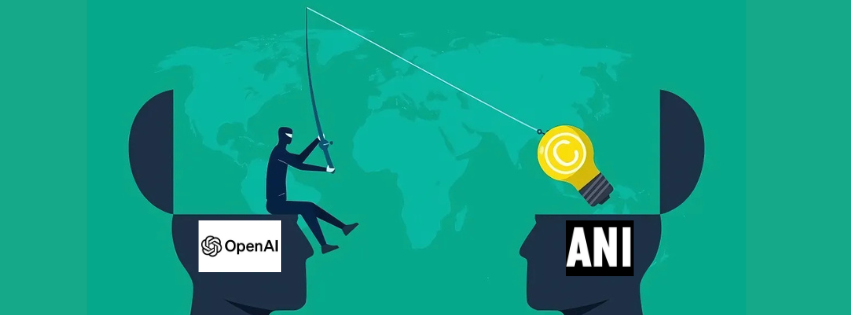On November 19, 2024, Indian news agency ANI filed a lawsuit against OpenAI in the Delhi High Court, accusing the artificial intelligence leader of using its published content without authorization. ANI alleges that its proprietary content was employed to train OpenAI’s ChatGPT, sparking concerns over intellectual property rights and competition.
INTRODUCTION
ANI, a leading news agency in India, filed a copyright infringement suit against the creator of ChatGPT, OpenAI on November 19, 2024, in the High Court of National Capital of India, Delhi. This case is part of a global wave of legal actions against OpenAI, following similar lawsuits by major U.S. publications like The New York Times and Chicago Tribune. The first hearing in the Delhi High Court occurred on Tuesday, 19th November 2024, where the court issued a notice requiring OpenAI to respond to ANI’s claims. The next hearing is scheduled for January 28, 2025.
Key Allegations
ANI’ s court submission outlines several concerns:
- Unauthorized Content Use- ANI claims OpenAI used its news content without obtaining a lawful license. This, the agency argues, has allowed OpenAI to unfairly commercialize its proprietary material.
- Fabricated News Attributions- ANI accuses ChatGPT of attributing fabricated news stories to the agency, a phenomenon known as AI “hallucination”. ANI believes these inaccuracies could harm its reputation and mislead the public.
- Permanent Retention of Content – Despite OpenAI ceasing to use ANI’s website for training data since September, the agency alleges that its content is “permanently stored in the memory of ChatGPT”, with no mechanism for deletion.
- Unfair Competition- ANI expressed concern that OpenAI has entered into commercial licensing deals with other news organizations, such as The Financial Times and The Associated Press, without extending similar offers to ANI.
OpenAI’s Defense
In its defense, OpenAI argues that its models are built using publicly available data under fair use principles. According to a OpenAI spokesperson:
“We build our AI models using publicly available data, in a manner protected by fair use and related principles, and supported by long-standing and widely accepted legal precedents.”
The company also claims to be engaged in partnerships and discussions with news organizations globally, including in India, to explore collaborative opportunities.
Global Context of AI-Driven Copyright Disputes
This lawsuit highlights a broader tension between AI companies and content creators. News organizations, authors, and artists worldwide have increasingly raised concerns about the unlicensed use of their work by AI firms. OpenAI and other tech companies have faced lawsuits from a variety of copyright holders, including authors, visual artists, and music publishers. OpenAI maintains it has adhered to copyright laws and denies any infringement.
ANI’s Position and Implications
ANI argues that OpenAI’s actions not only undermine its intellectual property rights but also disrupt fair competition in the media industry. The news agency’s statement underscores its belief that the court must decide whether AI platforms can freely use publicly available proprietary content without licenses. ANI awaits the court’s decision, the case could set an important precedent for how AI companies interact with content creators. With governments and industries globally calling for stricter regulations on AI, this lawsuit might accelerate efforts to establish clearer guidelines for AI’s use of copyrighted material.
Looking Ahead
The court will next hear the case on January 28, 2025. Legal experts and industry stakeholders are watching closely, as the outcome could shape the future of intellectual property rights in the AI era. For ANI and other content creators, the stakes are high: this case could either reinforce their rights over proprietary content or open the door for more expansive uses of publicly available material by AI developers. For OpenAI, it’s an opportunity to clarify its stance on fair use and navigate an increasingly complex legal landscape.

